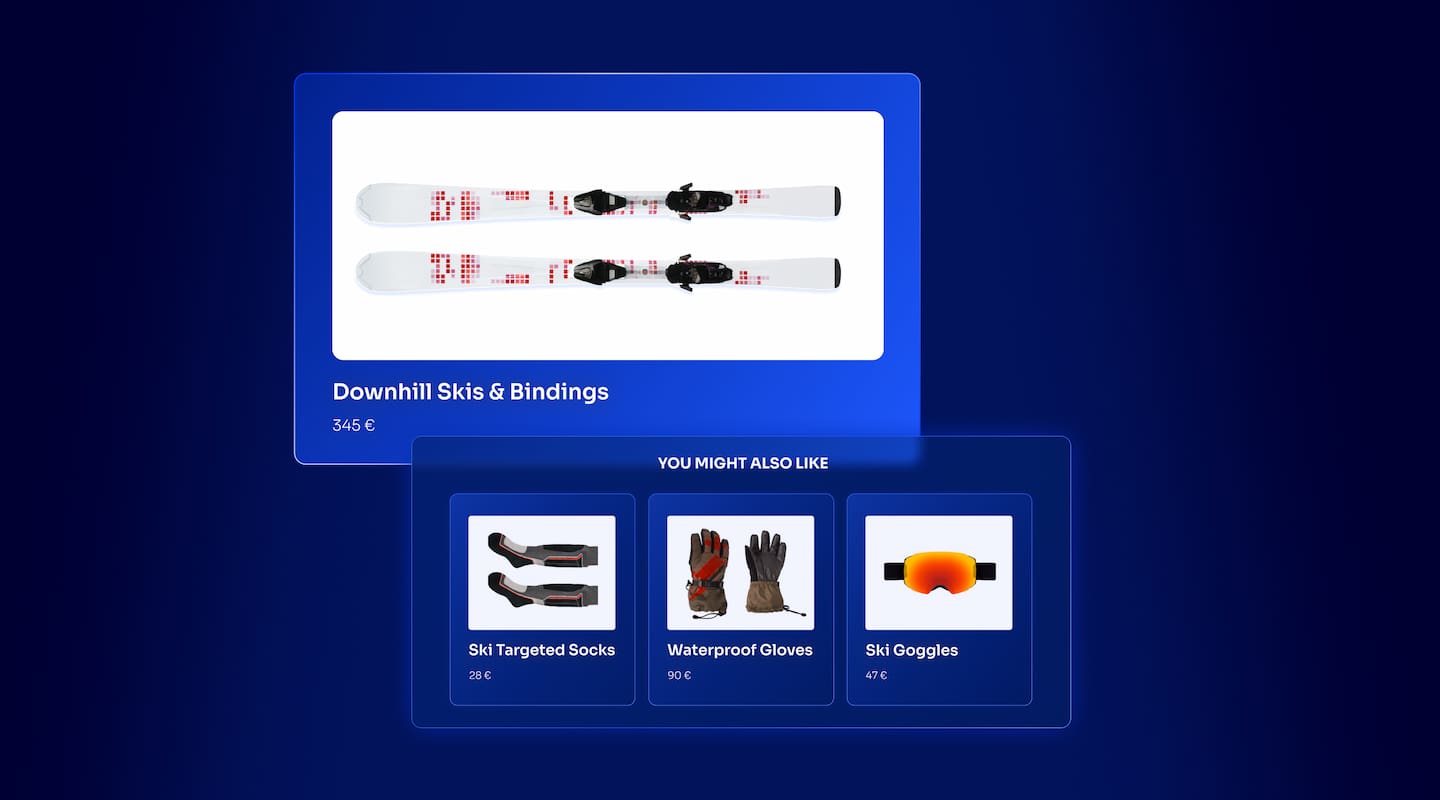Add InstantSearch and Autocomplete to your search experience in just 5 minutes
A good starting point for building a comprehensive search experience is a straightforward app template. When crafting your application’s ...
Senior Product Manager


A good starting point for building a comprehensive search experience is a straightforward app template. When crafting your application’s ...
Senior Product Manager

The inviting ecommerce website template that balances bright colors with plenty of white space. The stylized fonts for the headers ...
Search and Discovery writer

Imagine an online shopping experience designed to reflect your unique consumer needs and preferences — a digital world shaped completely around ...
Senior Digital Marketing Manager, SEO

Winter is here for those in the northern hemisphere, with thoughts drifting toward cozy blankets and mulled wine. But before ...
Sr. Developer Relations Engineer

What if there were a way to persuade shoppers who find your ecommerce site, ultimately making it to a product ...
Senior Digital Marketing Manager, SEO

This year a bunch of our engineers from our Sydney office attended GopherCon AU at University of Technology, Sydney, in ...
David Howden &
James Kozianski

Second only to personalization, conversational commerce has been a hot topic of conversation (pun intended) amongst retailers for the better ...
Principal, Klein4Retail

Algolia’s Recommend complements site search and discovery. As customers browse or search your site, dynamic recommendations encourage customers to ...
Frontend Engineer

Winter is coming, along with a bunch of houseguests. You want to replace your battered old sofa — after all, the ...
Search and Discovery writer

Search is a very complex problem Search is a complex problem that is hard to customize to a particular use ...
Co-founder & former CTO at Algolia

2%. That’s the average conversion rate for an online store. Unless you’re performing at Amazon’s promoted products ...
Senior Digital Marketing Manager, SEO

What’s a vector database? And how different is it than a regular-old traditional relational database? If you’re ...
Search and Discovery writer

How do you measure the success of a new feature? How do you test the impact? There are different ways ...
Senior Software Engineer

Algolia's advanced search capabilities pair seamlessly with iOS or Android Apps when using FlutterFlow. App development and search design ...
Sr. Developer Relations Engineer

In the midst of the Black Friday shopping frenzy, Algolia soared to new heights, setting new records and delivering an ...
Chief Executive Officer and Board Member at Algolia

When was your last online shopping trip, and how did it go? For consumers, it’s becoming arguably tougher to ...
Senior Digital Marketing Manager, SEO

Have you put your blood, sweat, and tears into perfecting your online store, only to see your conversion rates stuck ...
Senior Digital Marketing Manager, SEO

“Hello, how can I help you today?” This has to be the most tired, but nevertheless tried-and-true ...
Search and Discovery writer
Did you know that the tiny search bar at the top of many ecommerce sites can offer an outsized return on investment (ROI)? According to Econsultancy, about 30% of ecommerce consumers use on-site search. It can be much higher for marketplace search. Website visitors who perform site searches have been found to convert about twice as much as non-site-search visitors.
If you’re in the market for new ways to drive higher online revenue, reduce support costs, and boost brand loyalty, this is the blog for you. I’ll share some of the stats for how on-site search can help, and show how AI-powered search does even more. Let’s dig in.
Well-optimized ecommerce site search can have a powerful effect on a company’s success. For example:
With the average ecommerce conversion rate hovering around 2–3%, even a small lift in conversion from better on-site search can drive massive revenue improvements. These charts, based on two hypothetical companies with annual revenues of roughly $750 million and €50 million respectively, show how a change of as little as one tenth of one percent in conversion can have a huge effect:

Site search can also help to improve more than revenue. Better on-site search improves customer support and brand loyalty, and it can improve your ability to build better first-party data for personalization.
If all the numbers above aren’t convincing enough, consider this: site search also gives digital retailers incredible data from which to make great decisions. Search queries are intent data — they tell you exactly what your customers are looking for and what’s most important to them. With this data, you can make better decisions about what content to create, how to improve the customer experience, and more.
Search data can also be combined with customer data to provide personalized experiences. Ninety-one percent of consumers say they are more likely to shop with brands that include relevant offers and recommendations. Companies using advanced personalization report a $20 return for every $1 spent.
Those amazing stats above? They’re only for keyword search. With AI search, the numbers go even higher. Accenture indicated that AI search may someday account for 30% of all revenue generated. Moreover, sites with a semantic-based search engine have a low 2% rate in shopping cart abandonment, compared with as much as 40% on sites with only full- text search.
Just like generative AI such as ChatGPT, AI search uses large language models (LLMs) to better understand user inputs — in this case, searches. Its job is to deliver the best results from your site. Whereas ChatGPT is generating results based on large public datasets, AI search is delivering results based on your site’s data.
In doing so, AI search improves your ecommerce store’s results. It:
I’ll touch briefly on each of these points.
By better understanding user intent, AI search engines can improve both relevance and ranking to deliver higher-converting products. Algolia NeuralSearch, our own AI platform, has shown tremendous results in a very short period of time. Early beta customers have seen numbers such as a 70% drop in null results and 17% uplift in search-driven conversion rates in just the first few weeks of testing. Results vary from site to site, and the product is only newly launched and many new features are coming, but we expect to see it continue to rise as more data is received for self-learning optimization.
This brings up an interesting point. Data that’s generated on ecommerce websites from queries, clicks, conversions, sign-ups, etc., is used by the AI engine to improve results automatically. AI-powered ranking and re-ranking means you can set it and forget it, and in time, things will self-optimize. However, retailers can also get more immediate outcomes, influencing results by tweaking the search algorithm to match their business priorities and improve their numbers even faster.
While most retailers have only enough time and resources to optimize search for the top 20% of their product catalogs, AI search can optimize all 100% of your catalog with less effort.
On most sites, the top 10–20% of search queries use “head” terms — common phrases that most keyword search engines can easily handle. The bottom 50–80% of queries use long-tail keywords; these are less common queries but they make up a huge percentage of all search queries. Improving these queries requires writing rules and synonyms or doing other hacks and workarounds like keyword stuffing.

AI search offers a solution to optimizing everything. It has human-like understanding and doesn’t rely on keywords for retrieving results. It can understand the intent of someone searching for “something to keep my tea warm” or “best pedometer” — even if these long-tail keywords aren’t in your search index — to deliver better results to improve the end-user search experience. It can improve revenue everywhere — from the head to the long tail — without adding any additional work or overhead.
Not only does AI search drastically reduce null searches, it enriches queries that would have produced only a handful of results. We can measure the improvement using precision and recall.
Precision and recall are useful metrics for helping determine whether the results are any good. Ideally, precision and recall would both score 100%, and while in practice with a traditional keyword engine that’s very difficult, with AI search, it’s much closer to the ideal!
Here’s an example. We entered the same query, “chocoholic gift”, in both a traditional keyword search engine and an AI search engine.

The keyword engine results (shown in the image above) were ok, they didn’t return very many results. “Chocoholic” is a colloquialism for “chocolate enthusiast”, but a keyword engine wouldn’t understand that unless the retailer had created search-engine synonyms or rules indicating that the phrase is related to chocolate.
The AI engine (see image below) not only understood the query and was able to return good results (precision), it delivered much richer results (recall). Plus, the fuller results also improved the list of dynamic filters to choose from!

The better your AI solution for site or mobile search, the more revenue you can deliver from website traffic. Whether you’re using traditional keyword search or AI search, better search functionality can have a big impact on your company’s bottom line. AI search not only increases conversions, it gives you an immediate competitive advantage because it reduces consumer frustration. Algolia NeuralSearch is our own AI engine that combines the power of AI and keyword search through a single API for any ecommerce platform. Contact us to see how search can improve user experience and ecommerce ROI to new heights.
Powered by Algolia Recommend